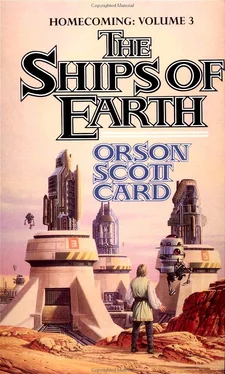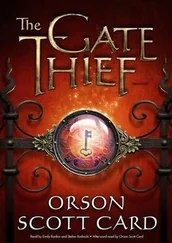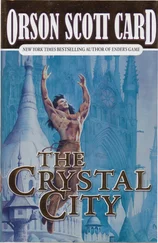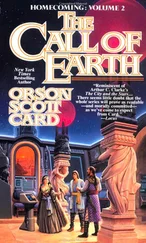Orson Card - THE SHIPS OF EARTH
Здесь есть возможность читать онлайн «Orson Card - THE SHIPS OF EARTH» весь текст электронной книги совершенно бесплатно (целиком полную версию без сокращений). В некоторых случаях можно слушать аудио, скачать через торрент в формате fb2 и присутствует краткое содержание. Жанр: Фантастика и фэнтези, на английском языке. Описание произведения, (предисловие) а так же отзывы посетителей доступны на портале библиотеки ЛибКат.
- Название:THE SHIPS OF EARTH
- Автор:
- Жанр:
- Год:неизвестен
- ISBN:нет данных
- Рейтинг книги:4 / 5. Голосов: 1
-
Избранное:Добавить в избранное
- Отзывы:
-
Ваша оценка:
- 80
- 1
- 2
- 3
- 4
- 5
THE SHIPS OF EARTH: краткое содержание, описание и аннотация
Предлагаем к чтению аннотацию, описание, краткое содержание или предисловие (зависит от того, что написал сам автор книги «THE SHIPS OF EARTH»). Если вы не нашли необходимую информацию о книге — напишите в комментариях, мы постараемся отыскать её.
THE SHIPS OF EARTH — читать онлайн бесплатно полную книгу (весь текст) целиком
Ниже представлен текст книги, разбитый по страницам. Система сохранения места последней прочитанной страницы, позволяет с удобством читать онлайн бесплатно книгу «THE SHIPS OF EARTH», без необходимости каждый раз заново искать на чём Вы остановились. Поставьте закладку, и сможете в любой момент перейти на страницу, на которой закончили чтение.
Интервал:
Закладка:
Stands of forest were evenly balanced with broad meadows; bees hummed over fields of wildflowers, promising honey easily found. There were streams with clear water, all leading to a wide, meandering river. Shedemei dismounted from her camel and probed into the soil. "It isn't like desert grassland," she said. "Not just roots. There's true topsoil here. We can farm these meadows without destroying them."
For the first time in their journey, Elemak didn't bother riding ahead to confer with Volemak about a campsite. There was no place that they passed through where they could not have stopped and spent the night.
"This land could hold the population of Seggidugu and they could all live in wealth," said Elemak. "Don't you think so, Father?"
"And we're the only humans here," he answered. "The Over-soul prepared this place for us. Ten million years, it waited here for us."
"Then we stay here? This is where we were coming?"
"We stay here for now," said Volemak. "For several years at least. The Oversoul isn't ready yet to take us out into the stars, back to Earth. So for now this is our home."
"How many years?" asked Elemak.
"Long enough that we should build houses of wood, and let our poor old tents become awnings and curtains," said Volemak. "There'll be no more journeying by land or sea from this place. Only when we rise up into the stars will we leave here. So let us call this place Dostatok, because it has plenty for our needs. The river we will name Rasa, because it is strong and full of life and it will never cease to supply us with all we need."
Rasa nodded her head gently to acknowledge the honor of the naming; as she did, she had the tiniest smile, which Luet, at least, recognized as a sign that Rasa knew her husband was trying to be conciliatory in his naming.
They made their settlement on a low promontory overlooking the mouth of the River Rasa, where it poured into the Southern Ocean—for that was how far south they had come, leaving the Scour Sea and the Sea of Stars behind them. Within a month they all had houses of wood, with thatched roofs, and in this latitude they had a growing season almost all the year, so it hardly mattered when they planted; there were some rains almost every day, and heavy storms swept over quickly, doing no damage.
The animals were so tame they had no fear of man; they soon domesticated the wild goats, which clearly were descended from the same animals that were herded in the hills near Basilica—camel's milk at last became a liquid that only baby camels had to drink, and the term "camel's cheese" became a euphemism for what well-fed babies left in their diapers. In the next six years, more babies were born, until there were thirty-five young ones, ranging in age from nearly eight years to several newborns. They farmed their fields together, and shared equally from the produce; from time to time the men would leave and hunt together, bringing home meat for drying and salting and skins for tanning. Rasa, Issib, and Shedemei undertook the education of the children by starting a school.
Not that their lives were one unrelenting tale of joy and peace. There were quarrels—for an entire year Kokor would not speak to Sevet over some trivial slight; there was another quarrel between Meb and Obring that led to Obring building a house farther from the rest of the group. There were resentments—some felt that others weren't working hard enough; some felt that their kind of work was of greater value than the labor of others. And there was a constant undercurrent of tension between the women, who looked to Rasa for leadership, and the men, who seemed to assume that no decision was final unless Volemak or Elemak had approved it. But they weathered all these crises, all these tensions, finding some balance of leadership between Volemak's loyalty to the purposes of the Oversoul, Rasa's clearsighted compassion, and Elemak's hardheaded assessments of what they needed to survive. Any unhappiness that hey might harbor in their hearts was kept in check, buried under the hard work that marked the rhythms of their lives, and then dissolved in the moments when joy was bountiful and love unstinted.
Life was good enough over the years that there was not a one of them who did not wish, when they thought of it at all, that the Oversoul would forget that they were there, and leave them in peace and happiness in Dostatok.
NINE—PERIMETER
When Chveya was seven years old she had understood perfectly how the world worked. Now she was eight, and there were some questions.
Like all the children of Dostatok, she grew up understanding the pure and simple relationships among families. For instance, Dazya and her younger brothers and sisters belonged to Hushidh and Issib. Krassya and Nokya and their younger brothers and sisters belonged to Kokor and Obring. Vasnya and her brother and sister belonged to Sevet and Vas. And so on, each set of children belonging to a mother and father.
The only oddity in this clear picture of the universe, at least until Chveya was eight, had been Grandfather and Grandmother, Volemak and Rasa, who not only had two children of their own—the brothers Okya and Yaya, who might as well be twins because, as Vasnya had said once, they had but one brain between them—but also were, in some vague way, the parents of all the other parents. She knew this because, in odd moments, she had heard adults call Grandmother not only "Lady Rasa" or "Grandmother" but also "Mother," and she heard her own father and Proya's father Elemak and Skiya's father Mebbekew call Grandfather "Father" more often than not.
In Chveya's mind this meant that Volemak and Rasa were the First Parents, having given rise to all of humanity. Now, she knew in the forepart of her mind that this was not accurate, for Shedemei had made it plain in school that there were millions of other humans living in faraway places, and clearly Grandfather and Grandmother had not given life to all of them. But those places were legendary. They were never seen. The whole world was the safe and beautiful land of Dostatok, and in that place there was no one, or so it seemed, who had not come from the marriage of Volemak and Rasa.
To Chveya, in fact, the world of the adults was remote enough to satisfy any need she had for strangeness; she had no need to wonder about mythical lands like Basilica and Potokgavan and Gorayni and Earth and Harmony, some of which were planets and some of which were cities and some of which were nations, though Chveya had never grasped the rules for which term went with each name. No, Chveya's world was dominated by the continual power struggle between Dazya and Proya for ascendancy among the children.
Dazya was Oldest Child, which conferred on her enormous authority which she cheerfully misused by exploiting the younger children whenever possible, converting it to personal service and "favors" which were received without gratitude. If any of the younger ones failed to obey, she would freeze them out of all games simply by letting it be known that if "that child" were part of a game or contest, she would not participate. Dazya's attitude toward the girls more near her own age was much the same, though it was more subtle—she didn't insist on humiliating personal services, but she did expect that when she decided things would be done a certain way, all the other girls would go along, and anyone who resisted was politely ostracized. Since Chveya was Second Child, and only three days younger, she saw no reason to accept a subservient role. The result was that she had a lot of time to herself, for Dazya would brook no equals, and none of the other girls had the spine to stand up to her.
At the same time that Dazya had forged her kingdom among the younger children and the older girls, Proya—Elemak's eldest son, and Second Boy—had made himself prince among princes. He was the only person who could ridicule Dazya and laugh at her rules, and all the older boys would follow him. Dazya would, of course, immediately ostracize the older boys, but this meant nothing to them since the games they wanted to join and the approval they craved were Proya's. The worst humiliation to Dazya was that her own brother Xodhya would join with Proya and use Proya's power as a shield for his own independence from his older sister's rule. Chveya's own younger brother Zhyat, and sometimes even Motya, a year younger than Zhyat and not really one of the older boys, joined with Proya regularly, but she didn't mind at all, for that meant even more humiliation for Dazya.
Читать дальшеИнтервал:
Закладка:
Похожие книги на «THE SHIPS OF EARTH»
Представляем Вашему вниманию похожие книги на «THE SHIPS OF EARTH» списком для выбора. Мы отобрали схожую по названию и смыслу литературу в надежде предоставить читателям больше вариантов отыскать новые, интересные, ещё непрочитанные произведения.
Обсуждение, отзывы о книге «THE SHIPS OF EARTH» и просто собственные мнения читателей. Оставьте ваши комментарии, напишите, что Вы думаете о произведении, его смысле или главных героях. Укажите что конкретно понравилось, а что нет, и почему Вы так считаете.









